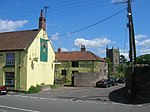Bristol City W.F.C.
Bristol City Women's Football Club is a women's association football team from the city of Bristol. Formed in 1998 as Bristol Rovers W.F.C., they were renamed Bristol Academy W.F.C. in 2005 following the withdraw of support from Bristol Rovers and increased involvement and academy development from Bristol Academy of Sport (now SGS Sport), part of South Gloucestershire and Stroud College. A second change of name, this time to Bristol City was approved by the FA Women's Football Board in time for the 2016 WSL season. With their home games relocating from SGS College’s Stoke Gifford Stadium to the Robins High Performance Centre and now Ashton Gate Stadium. Bristol City Women won promotion to the FA Women's Super League (WSL), the highest level of the women's game in England in 2016 and stayed there for five seasons before being relegated to the FA Women's Championship in 2021.
Excerpt from the Wikipedia article Bristol City W.F.C. (License: CC BY-SA 3.0, Authors).Bristol City W.F.C.
Clevedon Road,
Geographical coordinates (GPS) Address Nearby Places Show on map
Geographical coordinates (GPS)
| Latitude | Longitude |
|---|---|
| N 51.438401 ° | E -2.678267 ° |
Address
Clevedon Road
Clevedon Road
BS8 3TL
England, United Kingdom
Open on Google Maps









